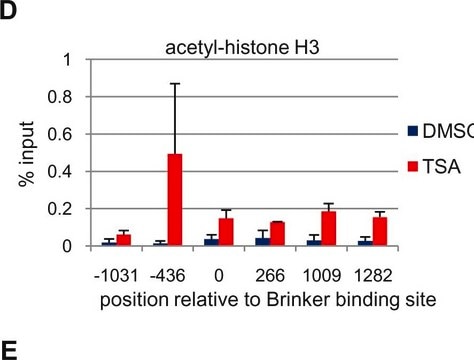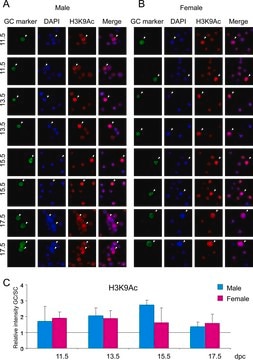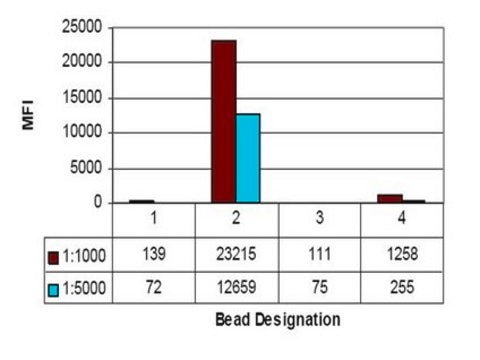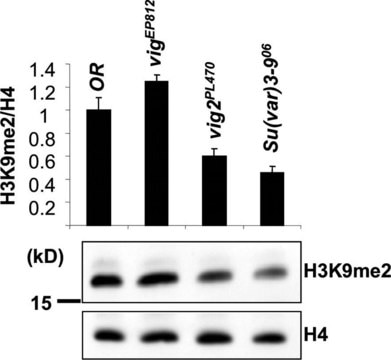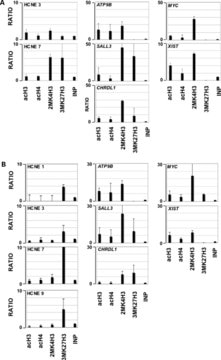07-540
Anti-acetyl-Histone H3 (Lys36) Antibody
serum, Upstate®
Synonym(s):
H3K36Ac, Histone H3 (acetyl K36)
Sign Into View Organizational & Contract Pricing
All Photos(1)
About This Item
UNSPSC Code:
12352203
eCl@ss:
32160702
NACRES:
NA.41
Recommended Products
biological source
rabbit
Quality Level
antibody form
serum
antibody product type
primary antibodies
clone
polyclonal
species reactivity
human
manufacturer/tradename
Upstate®
technique(s)
multiplexing: suitable
western blot: suitable
NCBI accession no.
UniProt accession no.
shipped in
wet ice
target post-translational modification
acetylation (Lys36)
Gene Information
human ... H3F3B(3021)
Specificity
Broad species cross reactivity is expected
Recognizes Histone H3 when acetylated on Lys36
Immunogen
KLH-conjugated, synthetic peptide containing the sequence ...GV[AcK]KP... in which [AcK] corresponds to acetyl-lysine 36 of human histone H3.
Application
Suggested dilutions:
Western Blot: 1:5000 - 1:20,000
ChIP Analysis: A representative lot was used by an independent laboratory for ChIP (Gatta, R., et al. (2011). Epigenetics. 6(4):526-534.)
Western Blot: 1:5000 - 1:20,000
ChIP Analysis: A representative lot was used by an independent laboratory for ChIP (Gatta, R., et al. (2011). Epigenetics. 6(4):526-534.)
Research Category
Epigenetics & Nuclear Function
Epigenetics & Nuclear Function
Research Sub Category
Histones
Histones
Use Anti-acetyl-Histone H3 (Lys36) Antibody (Rabbit Polyclonal Antibody) validated in WB, Mplex to detect acetyl-Histone H3 (Lys36) also known as H3K36Ac, Histone H3 (acetyl K36).
Quality
Routinely evaluated by immunoblot.
Target description
~17kDa
Physical form
100μl of rabbit antiserum containing 0.05% sodium azide and 30% glycerol.
Antiserum
Storage and Stability
2 years at -20°C from date of shipment
Legal Information
UPSTATE is a registered trademark of Merck KGaA, Darmstadt, Germany
Disclaimer
Unless otherwise stated in our catalog or other company documentation accompanying the product(s), our products are intended for research use only and are not to be used for any other purpose, which includes but is not limited to, unauthorized commercial uses, in vitro diagnostic uses, ex vivo or in vivo therapeutic uses or any type of consumption or application to humans or animals.
Not finding the right product?
Try our Product Selector Tool.
wgk_germany
WGK 1
flash_point_f
Not applicable
flash_point_c
Not applicable
Certificates of Analysis (COA)
Search for Certificates of Analysis (COA) by entering the products Lot/Batch Number. Lot and Batch Numbers can be found on a product’s label following the words ‘Lot’ or ‘Batch’.
Already Own This Product?
Find documentation for the products that you have recently purchased in the Document Library.
Endoplasmic reticulum stress-associated cone photoreceptor degeneration in cyclic nucleotide-gated channel deficiency.
Thapa, A; Morris, L; Xu, J; Ma, H; Michalakis, S; Biel, M; Ding, XQ
The Journal of Biological Chemistry null
Cluster analysis reveals differential transcript profiles associated with resistance training-induced human skeletal muscle hypertrophy.
Thalacker-Mercer, A; Stec, M; Cui, X; Cross, J; Windham, S; Bamman, M
Physiological Genomics null
Anton Eberharter et al.
EMBO reports, 3(3), 224-229 (2002-03-08)
The organization of eukaryotic chromatin has a major impact on all nuclear processes involving DNA substrates. Gene expression is affected by the positioning of individual nucleosomes relative to regulatory sequence elements, by the folding of the nucleosomal fiber into higher-order
Raffaella Gatta et al.
Epigenetics, 6(4), 526-534 (2011-02-10)
Histones post-translational modifications (PTMs) are crucial for transcriptional control, defining positive and negative chromatin territories. We previously described an extensive methylation-acetylation switch on cell cycle promoters using a single nucleosome ChIP assay. A key issue is how PTMs are locally
James N Psathas et al.
Molecular and cellular biology, 29(24), 6413-6426 (2009-10-14)
Posttranslational modifications to histones have been studied extensively, but the requirement for the residues within the tails for different stages of transcription is less clear. Using RNR3 as a model, we found that the residues within the N terminus of
Our team of scientists has experience in all areas of research including Life Science, Material Science, Chemical Synthesis, Chromatography, Analytical and many others.
Contact Technical Service
